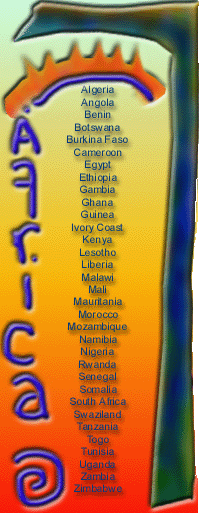|
'Exorcism'
on gay men?
Nigerian Bishop Emmanuel Chukwuma and the Rev. Richard
Kirkler's debate on homosexuality.
More:
http://www.integrity.usa.org/lambeth/exorcism.htm
Alternative
Lifestyles Foundation of Nigeria (ALFON): Nigerians
Organize and Vocalize By Joe Murnan, Co-Chair, Lesbigay SIG
Under
the fear of imprisonment and legal persecution, gays and lesbians
in Nigeria have been prevented from seeking equality. With
the installation of a civilian government this past spring,
gay and lesbian activists have formed ALFON to push for recognition
and equality for gays and lesbians. ALFON's mission is to
organize gays and lesbians into a formidable pressure group;
to engage in activities that would enhance, promote, protect,
advance the interest and integrity of its members to expand
membership to include the continent of Africa; and to break
the social taboo associated with being gay or lesbian.
One
of ALFON's founders and also a University of Texas at Arlington
graduate, Kene Uz Korie returned to the United States to study
gay and lesbian organizations. While he is there he will be
meeting with community leaders and studying federal and state
laws that pertain to the treatment of gays. During the month
of June he traveled to New York City to meet with several
larger organizations to learn their Missions and how they
operate.
To
the top
Korie
believes that the first step in the fight for recognition
and equality of gays and lesbians is to take a public stand
in Nigeria. According to Korie, there is a sizable gay and
lesbian population in Nigeria. Gays and lesbians have already
been waiting for the Transition from military dictatorship
to civilian rule that will enable them to speak out and voice
their opinions. He has met with hundreds of others who all
agree that this process will take time.
Six
years ago, Gen. Sani Abacha annulled the results of the presidential
elections, seized power and jailed the winner, Moshood Abiola.
Abacha cha controlled Nigeria with military might. According
to Korie Nigeria has represented a living hell for all those
seeking to express an alternative persuasion. Life is not
easy living under a military dictator, needless to talk of
open campaign for gay/lesbian rights. Before now, we were
afraid to speak out, we were marginalized, targets of hate
crimes, discriminated against, ridiculed, and treated unfairly
in the dispensation of justice and economic resources and
much more.
Both
Abacha and his anticipated successor, Abiola, died in June
and July of 1998. Abacha's successor, Gen. Abdulsalam Abubakar,
announced presidential elections and a return to civilian
rule by May 1999. Even though May 1999 officially marked the
return to a democratic government, Korie and fellow activists
remain realistic about their aspirations. Homosexuality is
still one of Nigeria's biggest taboos Korie noted. We don't
expect to have a victory over night, but we intend to talk
about it, write about it, he said. And as time goes on we
plan to invite public speakers from (America) to come and
address us and Nigeria.
To
the top
During
the first week of June, program coordinator Brent Chuks held
ALFON's first public press conference to announce its goals.
ALFON's agenda includes setting up a central office in Lagos
with a legal resource unit. It also plans to establish an
AIDS prevention, awareness and management facility. ALFON
plans to establish and publish a special gay/lesbian biweekly
magazine. The establishment and operation of a gay/lesbian
radio station is also included in the agenda.
In
his meetings with various gay American organizations Korie
is also learning how they operate, while scouting for financial
donations and contributions that could assist the Foundation
as it begins. The Foundation doesn't expect an overnight victory,
but as Korie noted the group is taking the first step to organize.
For more information about ALFON call 214-770-4090 or 001-234-1-266-8559.
Korie can be contacted at Kenuezo@netscape.net.
Natural
gestures
Young
girls growing up in Nigeria easily engage in forms of physical
contact that might be labelled 'lesbian' in the West. Yet
African society is deeply hostile to homosexuality, says Buchi
Emecheta. She gives a personal view. http://www.oneworld.org/ni/issue201/gestures.htm
To
the top
MEDIA
MIRROR:
Anti-lesbian rapes in Nigeria
In
March 1997 the International Gay and Lesbian Human Rights
Commission confirmed reports on the rape of four Nigerian
lesbians in Calabar in September 1994. The four women had
sought refuge at a feminist center, when an unknown number
of men attacked the center and raped them at gun point. Just
a few days earlier, one of the critically injured survivors
had published an article on lesbianism in Nigeria in which
she traced the advent of Nigerian lesbianism and condemned
previous attacks against the center.
The
reporting of these September 1994 attacks sheds crucial light
on the often undocumented regularity and impunity of anti-lesbian
rapes in Nigeria. The rapes of these four women were directly
linked to an earlier attack against another woman in the town
of Eket in Akwa Ibom state, who reportedly was also gang raped
at gun point by the same men. She was undergoing medical treatment
at the feminist center when the rapists attacked the center.
Not
only lesbians have fallen prey to this rash of violent attacks
against women. On November 9, 1996, the Saturday Punch, a
local Nigerian daily, reported the 10 man rape and consequent
murder of a market business woman in an Owena boundary market,
which is the nerve centre of trade between Osum and Ondo states.
Nigerian
feminists have contextualized the increasing incidence of
rape as manifestations of male domination and subsequent female
exploitation. According to a recently published concept paper
by a group of Nigerian feminist activists, 'Christian and
Islamic religions brought by the colonialists introduced new
roles (for women) that reinforced traditional (patriarchal)
provisions, and new areas not covered by tradition.'
Back
to the top
Back
to the Africa by Country Home page
|
